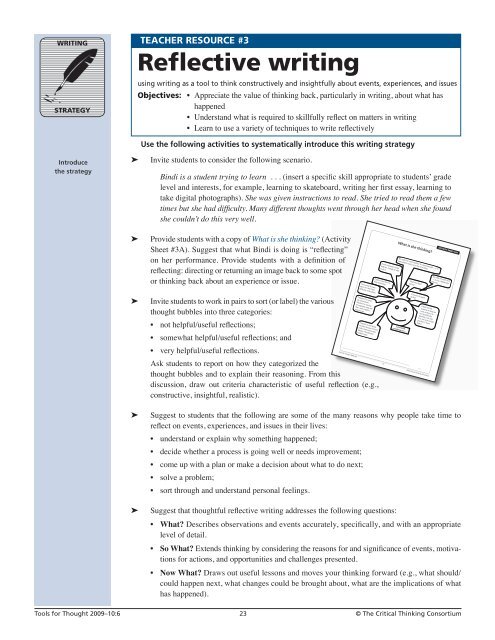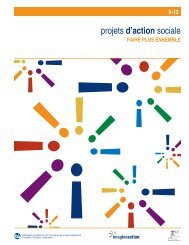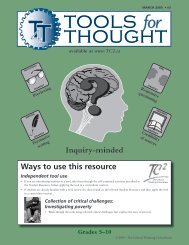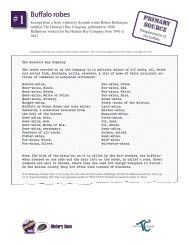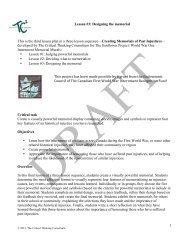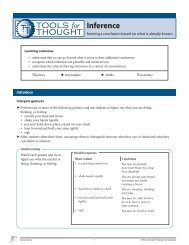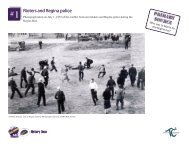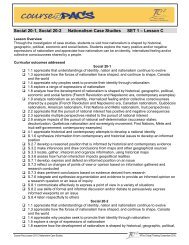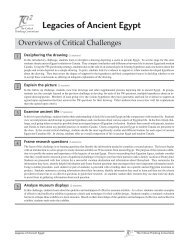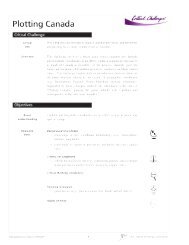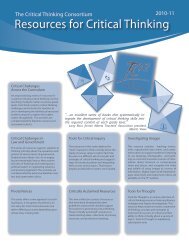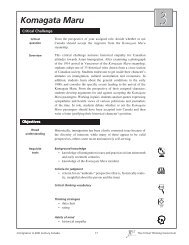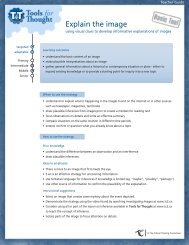Reflective writing - The Critical Thinking Consortium
Reflective writing - The Critical Thinking Consortium
Reflective writing - The Critical Thinking Consortium
You also want an ePaper? Increase the reach of your titles
YUMPU automatically turns print PDFs into web optimized ePapers that Google loves.
WRITING<br />
STRATEGY<br />
<br />
<strong>Reflective</strong> <strong>writing</strong><br />
using <strong>writing</strong> as a tool to think constructively and insightfully about events, experiences, and issues<br />
Objectives: • Appreciate the value of thinking back, particularly in <strong>writing</strong>, about what has<br />
happened<br />
• Understand what is required to skillfully reflect on matters in <strong>writing</strong><br />
• Learn to use a variety of techniques to write reflectively<br />
Introduce<br />
the strategy<br />
➤<br />
Use the following activities to systematically introduce this <strong>writing</strong> strategy<br />
Invite students to consider the following scenario.<br />
Bindi is a student trying to learn . . . (insert a specific skill appropriate to students’ grade<br />
level and interests, for example, learning to skateboard, <strong>writing</strong> her first essay, learning to<br />
take digital photographs). She was given instructions to read. She tried to read them a few<br />
times but she had difficulty. Many different thoughts went through her head when she found<br />
she couldn’t do this very well.<br />
➤<br />
Provide students with a copy of What is she thinking? (Activity<br />
Sheet #3A). Suggest that what Bindi is doing is “reflecting”<br />
on her performance. Provide students with a definition of<br />
reflecting: directing or returning an image back to some spot<br />
or thinking back about an experience or issue.<br />
<br />
<br />
<br />
<br />
<br />
<br />
<br />
<br />
<br />
<br />
What is she thinking?<br />
<br />
<br />
<br />
<br />
<br />
<br />
<br />
ACTIVITY SHEET #3A<br />
<br />
<br />
<br />
➤<br />
➤<br />
➤<br />
Invite students to work in pairs to sort (or label) the various<br />
thought bubbles into three categories:<br />
• not helpful/useful reflections;<br />
• somewhat helpful/useful reflections; and<br />
• very helpful/useful reflections.<br />
Ask students to report on how they categorized the<br />
thought bubbles and to explain their reasoning. From this<br />
discussion, draw out criteria characteristic of useful reflection (e.g.,<br />
constructive, insightful, realistic).<br />
Suggest to students that the following are some of the many reasons why people take time to<br />
reflect on events, experiences, and issues in their lives:<br />
• understand or explain why something happened;<br />
• decide whether a process is going well or needs improvement;<br />
• come up with a plan or make a decision about what to do next;<br />
• solve a problem;<br />
• sort through and understand personal feelings.<br />
Tools for Thought 2009–10:6 26 © <strong>The</strong> <strong>Critical</strong> <strong>Thinking</strong> <strong>Consortium</strong><br />
Suggest that thoughtful reflective <strong>writing</strong> addresses the following questions:<br />
• What? Describes observations and events accurately, specifically, and with an appropriate<br />
level of detail.<br />
• So What? Extends thinking by considering the reasons for and significance of events, motivations<br />
for actions, and opportunities and challenges presented.<br />
• Now What? Draws out useful lessons and moves your thinking forward (e.g., what should/<br />
could happen next, what changes could be brought about, what are the implications of what<br />
has happened).<br />
<br />
<br />
<br />
<br />
<br />
<br />
<br />
<br />
<br />
<br />
<br />
<br />
<br />
<br />
<br />
<br />
<br />
<br />
<br />
<br />
<br />
<br />
<br />
<br />
<br />
<br />
<br />
<br />
<br />
<br />
Tools for Thought 2009–10:6 23 © <strong>The</strong> <strong>Critical</strong> <strong>Thinking</strong> <strong>Consortium</strong>
➤<br />
Invite students to examine the examples of reflective <strong>writing</strong><br />
on Is this thoughtful reflection? (Activity Sheet #3B). Instruct<br />
students to identify lines in each <strong>writing</strong> piece that correspond<br />
to the three questions above (What? So What? Now<br />
What?). For elementary students, complete one example<br />
as a class. Once students have identified the components<br />
of each reflection, invite them to judge the extent to<br />
which the <strong>writing</strong> piece is a thoughtful reflection based<br />
on the criteria for identifying a useful reflection (e.g.,<br />
constructive, specific, realistic, purposeful).<br />
<br />
Are these thoughtful reflections?<br />
<br />
<br />
<br />
<br />
<br />
<br />
<br />
<br />
<br />
<br />
<br />
<br />
<br />
<br />
<br />
<br />
<br />
<br />
<br />
<br />
<br />
<br />
<br />
<br />
ACTIVITY SHEET #3B<br />
<br />
<br />
<br />
<br />
<br />
Practise the strategy<br />
➤<br />
<br />
Invite students to try their hand at reflecting orally<br />
before <strong>writing</strong> a reflection. Choose a project or<br />
skill they are currently working on in class (e.g.<br />
presenting orally, <strong>writing</strong> a paragraph, listening<br />
attentively, executing a volleyball serve). Using the questions<br />
as a guide, invite students to “think aloud” to a partner about how<br />
their skill or project is developing:<br />
Tools for Thought 2009–10:6 27 © <strong>The</strong> <strong>Critical</strong> <strong>Thinking</strong> <strong>Consortium</strong><br />
• What? Describe observations and events accurately, specifically, and with an appropriate<br />
level of detail.<br />
• So What? Extend thinking by considering reasons for events, significance of events, motivations<br />
for actions, opportunities and challenges presented.<br />
• Now What? Draw out useful lessons and move your thinking forward (e.g., what should/<br />
could happen next, what changes could be brought about, what are the implications of what<br />
has happened).<br />
➤<br />
As a class, discuss the usefulness of the questions and the<br />
quality of the oral reflection. Invite students to try reflecting<br />
in <strong>writing</strong>. Suggest that following a more detailed set of questions<br />
may help them with their <strong>writing</strong>. Provide students with<br />
a copy of Guiding my reflections (Activity Sheet #3C). Ask<br />
them to use the activity sheet to help them prepare a written<br />
reflection on the experience they practised orally.<br />
Guiding my reflections<br />
<br />
<br />
<br />
<br />
<br />
<br />
<br />
<br />
<br />
<br />
<br />
<br />
<br />
<br />
<br />
<br />
<br />
<br />
<br />
<br />
<br />
<br />
ACTIVITY SHEET #3C<br />
<br />
<br />
Reinforce the strategy<br />
➤ Introduce <strong>Reflective</strong> <strong>writing</strong> (Student Resource #3).<br />
Review each of the elements: the purpose, strategies,<br />
practice sample, and self-assessment rubric. Encourage<br />
students to refer to this resource when using the<br />
strategy in the future. Discuss with students when<br />
the strategy of reflection might be useful both in and out<br />
of school.<br />
<br />
<br />
<br />
<br />
<br />
<br />
<br />
<br />
<br />
<br />
<br />
<br />
<br />
<br />
<br />
<br />
<br />
Tools for Thought 2009–10:6 29 © <strong>The</strong> <strong>Critical</strong> <strong>Thinking</strong> <strong>Consortium</strong><br />
Purpose<br />
<br />
<br />
<br />
<br />
<br />
For a sample use of the<br />
strategy, see the next<br />
page<br />
<br />
<br />
<br />
the strategy<br />
<br />
<br />
STUDENT RESOURCE #3<br />
<br />
<br />
<br />
<br />
<br />
<br />
<br />
Assessing my use of “Writer’s voice”<br />
Accomplished Good Basic Needs improvement<br />
Answering “What” — recording observations:<br />
I can easily record clearly and<br />
with an appropriate level of<br />
detail many key observations<br />
about the event.<br />
I can record many<br />
observations about the event,<br />
but they are not always clear<br />
Answering “So What?” — extending your thinking:<br />
and specific.<br />
I can record a few key<br />
I can think deeply and<br />
observations, but they are not<br />
always as clear and specific as<br />
insightfu ly about the<br />
they should be.<br />
I struggle to identify key<br />
situation and am able to<br />
identify various possibilities<br />
I can usua ly think deeply<br />
observations of an event and<br />
to record them clearly.<br />
that extend my thinking.<br />
and insightfu ly about the<br />
situation and am able to<br />
identify some possibilities that<br />
might extend my thinking.<br />
I can sometimes explore<br />
aspects of the situation,<br />
but I have difficulty moving<br />
I struggle to explore the<br />
beyond what is obvious to<br />
identify possibilities that<br />
situation and to identify any<br />
Answering “Now What?” — Drawing out lessons:<br />
I am clear about what I have<br />
learned and develop very<br />
extend my thinking.<br />
possibilities that extend my<br />
thinking.<br />
constructive and reasonable<br />
options for moving forward.<br />
I am usua ly clear about<br />
what I have learned and<br />
develop some constructive<br />
and reasonable options for<br />
moving forward.<br />
I can sometimes identify<br />
what I have learned and<br />
develop some options for<br />
moving forward, but they are<br />
I struggle to think beyond<br />
Tools for Thought 2009–10:6 30 © <strong>The</strong> <strong>Critical</strong> <strong>Thinking</strong> <strong>Consortium</strong><br />
not always constructive and<br />
reasonable.<br />
what actua ly happened and<br />
to reach any clarity about<br />
what I have learned or what I<br />
might do to move forward.<br />
Tools for Thought 2009–10:6 24 © <strong>The</strong> <strong>Critical</strong> <strong>Thinking</strong> <strong>Consortium</strong>
Apply the strategy<br />
to everyday teaching<br />
Assess the use<br />
of the strategy<br />
➤<br />
➤<br />
➤<br />
➤<br />
➤<br />
To further reinforce the strategy, choose a character in a story or a historical figure students are<br />
currently studying. Ask students to write a reflection from the perspective of that character at a<br />
pivotal moment in their lives. Encourage students to use Guiding my reflections (Activity Sheet<br />
#3C) to support their <strong>writing</strong>. Invite students to exchange their reflective <strong>writing</strong> pieces with a<br />
partner. Invite partners to use the rubric to provide feedback to the “character” about the quality<br />
of his or her reflection.<br />
If lifestyle choices is a topic you wish to investigate with your students, use the material on lifestyle<br />
choices found in this resource.and ask students to write a letter to themselves encouraging<br />
healthy lifestyle choices. (<strong>Critical</strong> challenge #1)<br />
At appropriate times over the ensuing several weeks, encourage students to use this strategy in<br />
regular classroom situations, including the following:<br />
• examining their behaviour and considering alternative choices;<br />
• gauging their progress in an ongoing project or task;<br />
• thinking about what they have learned at the end of a lesson;<br />
• examining their own work habits after or in the midst of an activity;<br />
• considering how they felt during a discussion of a controversial topic;<br />
• revisiting an assignment after it has been marked and handed back by the teacher;<br />
• making decisions about activities and work habits.<br />
Encourage students to refer to the rubric found in <strong>Reflective</strong> <strong>writing</strong> (Student Resource #3) when<br />
self-assessing their use of this literacy strategy.<br />
• Allow students opportunities to apply the strategy two or three times without evaluation.<br />
• Guide students in interpreting and using the rubric to assess their own responses.<br />
• Encourage students to use the rubric whenever they use this strategy.<br />
To use the rubric for teacher evaluation of student work, remove the first person (student) reference<br />
from each descriptor.<br />
Tools for Thought 2009–10:6 25 © <strong>The</strong> <strong>Critical</strong> <strong>Thinking</strong> <strong>Consortium</strong>
What is she thinking?<br />
<br />
So what if it wasn’t perfect. It’s good enough — I’m<br />
just going to move on to the next thing.<br />
If only someone would<br />
help me, I might be able<br />
to do it.<br />
So what if I can’t do it<br />
— it was a dumb idea<br />
anyway.<br />
<br />
That’s too hard<br />
for me.<br />
I was good at some<br />
parts of it but I had<br />
difficulty with others.<br />
I think I’ll re-read<br />
the instructions.<br />
Maybe I’m missing<br />
an important step and<br />
that’s why it didn’t<br />
work for me.<br />
I guess I just have to<br />
keep practicing.<br />
<br />
<br />
I’ll never be good<br />
at that!<br />
I think I’ll ask<br />
someone to help me<br />
work on this. I’m<br />
having difficulty<br />
figuring it out, but<br />
I’m sure with a little<br />
practice, I’ll get<br />
better.<br />
I think I’m not trying<br />
my best because I’m not<br />
really interested in this.<br />
Maybe I should pick<br />
another topic.<br />
I just tried<br />
something new . . .<br />
Tools for Thought 2009–10:6 26 © <strong>The</strong> <strong>Critical</strong> <strong>Thinking</strong> <strong>Consortium</strong>
Are these thoughtful reflections?<br />
<br />
Instructions:<br />
1. Read the scenario and the first sample student reflection.<br />
2. On the student reflection, use different colours to underline the comments that address these questions: What? So<br />
What? and Now What? (Not all reflections address all three questions.)<br />
• Use green to underline comments that answer the question “What?” (describes observations and events accurately,<br />
specifically, and with an appropriate level of detail).<br />
• Use red to underline comments that answer the question “So What?” (extends thinking by considering reasons for<br />
events, the significance of events, motivations for actions, opportunities and challenges presented).<br />
• Use blue to underline comments that answer the question “Now what?” (draws out useful lessons and moves your<br />
thinking forward, for example, what should/could happen next, what changes could be brought about, what are the<br />
implications of what has happened).<br />
3. Rate each student reflection on a scale of 0 to 5 according to the extent to which it offers a thoughtful reflection. In<br />
making this assessment, consider the following:<br />
• constructive: Will the reflection help the person move forward or is it simply negative thinking?<br />
• insightful: Does the reflection probe the issues or simply state the obvious?<br />
• realistic: Is the reflection grounded in reality or is it pure fantasy?<br />
Scenario:<br />
Yesterday, the teacher was absent. A substitute teacher taught the class for the day. When the regular<br />
teacher returned the next day she received a note from the substitute teacher saying that the class<br />
behaved very badly. <strong>The</strong> substitute teacher said that most students were not paying attention while<br />
she was teaching, many students were talking to their neighbours when they should have been working,<br />
and a few students even threw paper airplanes. <strong>The</strong> classroom was a mess by the end of the day.<br />
When the regular teacher read the note she was very upset. She asked every student in the class to<br />
write a reflection on what happened yesterday. Here are some examples.<br />
Student reflection #1<br />
Yesterday we had a supply teacher. She was mean. She yelled at us so no one wanted to<br />
listen to her. We weren’t as bad as she says we were and I know I didn’t do anything<br />
wrong. Why couldn’t we just get a different supply teacher next time? Next time the<br />
teacher is going to be away, I’m just going to tell my parents I’m sick and stay home!<br />
How thoughtful is this student’s reflection? 0 1 2 3 4 5<br />
Explanation of my rating:<br />
Tools for Thought 2009–10:6 27 © <strong>The</strong> <strong>Critical</strong> <strong>Thinking</strong> <strong>Consortium</strong>
Student reflection #2<br />
Yesterday we had a supply teacher. Some kids were really bad. <strong>The</strong>y were talking and making<br />
faces at her and not paying attention. <strong>The</strong>y were throwing stuff around the classroom and<br />
the classroom was a real mess afterwards. It was awful. I think all those kids should get<br />
suspended.<br />
How thoughtful is this student’s reflection? 0 1 2 3 4 5<br />
Explanation of my rating:<br />
Student reflection #3<br />
I’m really upset. It’s totally unfair that we all have to write this dumb reflection. What<br />
a waste of time. Only the kids who misbehaved should be punished by having to do extra<br />
<strong>writing</strong>. I’m so frustrated by the other kids in this class! Why can’t people just behave!.<br />
How thoughtful is this student’s reflection? 0 1 2 3 4 5<br />
Explanation of my rating:<br />
Student reflection #4<br />
<strong>The</strong> class behaved really badly yesterday. I don’t think I was the worst one but I definitely<br />
did some things I shouldn’t have done. I was talking with Jenny when the supply teacher<br />
was giving instructions and I didn’t get much work done. In fact, I had to take the work<br />
home to finish it which was silly since I could have just finished it in class and then I<br />
would have not had homework last night! I’m not sure why the class behaved so badly. I<br />
guess we thought we could get away with it but now it’s made our regular teacher upset<br />
and I feel bad about that. I’m not sure anyone will listen to me next time if I say that we<br />
should calm down but at least I can make sure I don’t behave badly.<br />
How thoughtful is this student’s reflection? 0 1 2 3 4 5<br />
Explanation of my rating:<br />
Tools for Thought 2009–10:6 28 © <strong>The</strong> <strong>Critical</strong> <strong>Thinking</strong> <strong>Consortium</strong>
Guiding my reflections<br />
Topic: ____________________________________________________________________________________________________<br />
1. Identify your purpose(s) for reflecting.<br />
Why?<br />
Clarify for yourself why it<br />
would be helpful to think<br />
back on the topic<br />
Check all the purposes that apply.<br />
❏ understand or explain why something happened<br />
❏ decide whether a situation is going well or needs improvement<br />
❏ come up with a plan or decisions about what to do next<br />
❏ solve a problem<br />
❏ sort through and understand personal feelings about something<br />
❏ other:<br />
2. Record basic observations about the event or situation.<br />
What happened?<br />
What?<br />
What did you observe?<br />
What have you done so far?<br />
3. Revisit the issues in your mind and add your own insights and thoughts.<br />
So What?<br />
What feelings did the event evoke?<br />
Did you react appropriately?<br />
What caused your feelings or<br />
reactions?<br />
What was the most important<br />
thing that has happened? <strong>The</strong><br />
most significant difficulty you are<br />
experiencing?<br />
Why do you think the event<br />
happened? Why do you think it’s<br />
a source of difficulty?<br />
How might this kind of situation<br />
be approached differently?<br />
4. Consider what you may have learned or need to learn.<br />
Now What?<br />
What have you realized that you<br />
didn’t understand before?<br />
What have you learned?<br />
What do you wonder about now?<br />
What will you do next?<br />
How do you feel now that you’ve<br />
thought further about this?<br />
Tools for Thought 2009–10:6 29 © <strong>The</strong> <strong>Critical</strong> <strong>Thinking</strong> <strong>Consortium</strong>
<strong>Reflective</strong> <strong>writing</strong><br />
using <strong>writing</strong> as a tool to think constructively and<br />
insightfully about events, experiences, and issues<br />
STUDENT RESOURCE <br />
Purpose<br />
This strategy helps me<br />
sort out my thoughts<br />
and feelings and make<br />
decisions about what to<br />
do next.<br />
For a sample use of the<br />
strategy, see the next<br />
page<br />
APPLY<br />
the strategy<br />
• Identify a purpose for reflecting (e.g., understand, clarify, decide).<br />
• Record your basic observations about an event, idea or relationship.<br />
• Revisit the events in your mind and add your insights and thoughts about<br />
what happened.<br />
• Consider what this means for you and for your future actions.<br />
• Review to check that your written reflections are constructive (help move<br />
you forward in your purpose), insightful (probe the issues) and realistic<br />
(grounded in reality).<br />
Assessing my use of “writer’s voice”<br />
Accomplished Good Basic Needs improvement<br />
Answering “What” — recording observations:<br />
I can easily record clearly and<br />
with an appropriate level of<br />
detail many key observations<br />
about the event.<br />
I can record many<br />
observations about the event,<br />
but they are not always clear<br />
and specific.<br />
I can record a few key<br />
observations, but they are not<br />
always as clear and specific as<br />
they should be.<br />
I struggle to identify key<br />
observations of an event and<br />
to record them clearly.<br />
Answering “So What?” — extending your thinking:<br />
I can think deeply and<br />
insightfully about the<br />
situation and am able to<br />
identify various possibilities<br />
that extend my thinking.<br />
I can usually think deeply<br />
and insightfully about the<br />
situation and am able to<br />
identify some possibilities that<br />
might extend my thinking.<br />
I can sometimes explore<br />
aspects of the situation,<br />
but I have difficulty moving<br />
beyond what is obvious to<br />
identify possibilities that<br />
extend my thinking.<br />
I struggle to explore the<br />
situation and to identify any<br />
possibilities that extend my<br />
thinking.<br />
Answering “Now What?” — Drawing out lessons:<br />
I am clear about what I have<br />
learned and develop very<br />
constructive and reasonable<br />
options for moving forward.<br />
I am usually clear about<br />
what I have learned and<br />
develop some constructive<br />
and reasonable options for<br />
moving forward.<br />
I can sometimes identify<br />
what I have learned and<br />
develop some options for<br />
moving forward, but they are<br />
not always constructive and<br />
reasonable.<br />
I struggle to think beyond<br />
what actually happened and<br />
to reach any clarity about<br />
what I have learned or what I<br />
might do to move forward.<br />
Tools for Thought 2009–10:6 30 © <strong>The</strong> <strong>Critical</strong> <strong>Thinking</strong> <strong>Consortium</strong>
STUDENT RESOURCE <br />
SAMPLE<br />
use of the strategy<br />
Guiding my reflections<br />
Working with my group to complete our project<br />
Topic: ____________________________________________________________________________________________________<br />
1. Identify your purpose(s) for reflecting.<br />
Why?<br />
Clarify for yourself why it<br />
would be helpful to think<br />
back on the topic<br />
Check all the purposes that apply.<br />
❏ ✔ understand or explain why something happened<br />
❏ ✔ decide whether a situation is going well or needs improvement<br />
❏ come up with a plan or decisions about what to do next<br />
❏ solve a problem<br />
❏ sort through and understand personal feelings about something<br />
❏ other:<br />
2. Record basic observations about the event or situation.<br />
What?<br />
What happened?<br />
What did you observe?<br />
What have you done so far?<br />
So far our group has chosen a topic and started the research.<br />
Each of us looked at a different source of information. It was<br />
a bit difficult to decide who would do which source since<br />
some seemed shorter and easier than others but we worked it<br />
out so it’s fair.<br />
When we got into groups yesterday in class to share our<br />
research so far, things didn’t go very well. After everyone else<br />
shared their research, I felt like what I had to share wasn’t<br />
very good. I shared it anyway, but I don’t think my group<br />
members were very happy with me.<br />
3. Revisit the issues in your mind and add your own insights and thoughts.<br />
So What?<br />
What feelings did the event evoke?<br />
Did you react appropriately?<br />
What caused your feelings or reactions?<br />
What was the most important thing that has<br />
happened? <strong>The</strong> most significant difficulty<br />
you are experiencing?<br />
Why do you think the event happened? Why<br />
do you think it’s a source of difficulty?<br />
How might this kind of situation be<br />
approached differently?<br />
I felt pretty bad about not having very much information to<br />
share. I felt like I let my group down. I also felt angry,<br />
though, since my source ended up being more difficult to<br />
understand than I thought. But I don’t think they gave me a<br />
hard one on purpose. I think it just turned out that way.<br />
Tools for Thought 2009–10:6 31 © <strong>The</strong> <strong>Critical</strong> <strong>Thinking</strong> <strong>Consortium</strong>
STUDENT RESOURCE <br />
SAMPLE<br />
use of the strategy<br />
Guiding my reflections<br />
Working with my group to complete our project<br />
Topic: ____________________________________________________________________________________________________<br />
4. Consider what you may have learned or need to learn.<br />
Now What?<br />
What have you realized that you didn’t<br />
understand before?<br />
What have you learned?<br />
What do you wonder about now?<br />
What will you do next?<br />
How do you feel now that you’ve thought<br />
further about this?<br />
How might this kind of situation be approached<br />
differently?<br />
I think I probably should have had a quick look at my book<br />
when we first divided the work so I could see if I could<br />
handle it. Instead, I ended up leaving the work until the last<br />
minute so I didn’t have time to ask for help. I’ve also learned<br />
that my group members are pretty nice and helpful. I think I<br />
should let them know when I’m having difficulty and see if they<br />
have suggestions.<br />
Our group has decided to meet tomorrow again to share more<br />
information and decide on our next steps. I’m feeling better<br />
about the whole thing, and this time, I’ll make sure I’m ready<br />
for sharing tomorrow!<br />
Tools for Thought 2009–10:6 32 © <strong>The</strong> <strong>Critical</strong> <strong>Thinking</strong> <strong>Consortium</strong>


